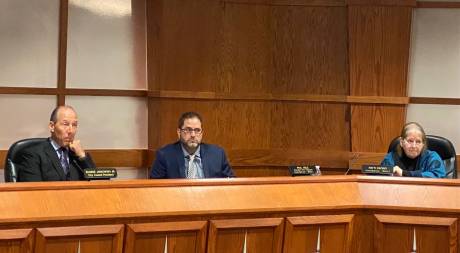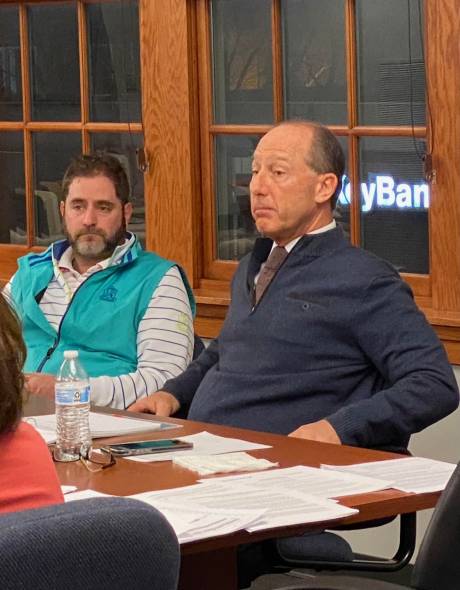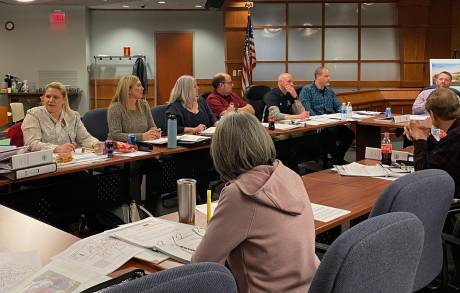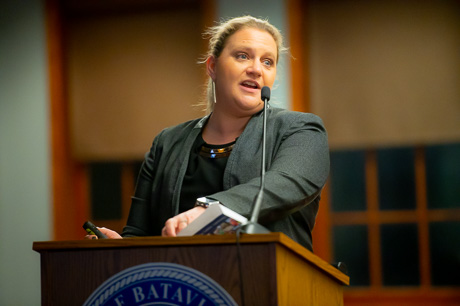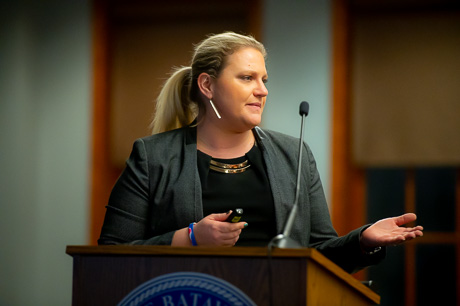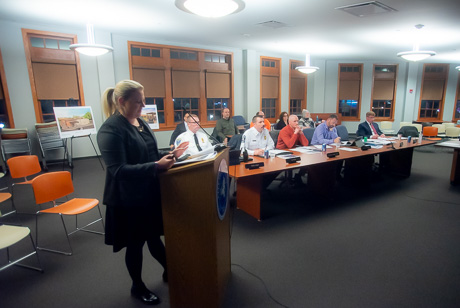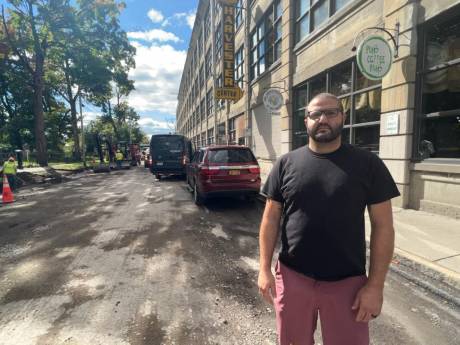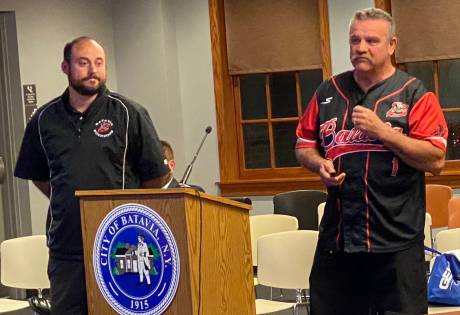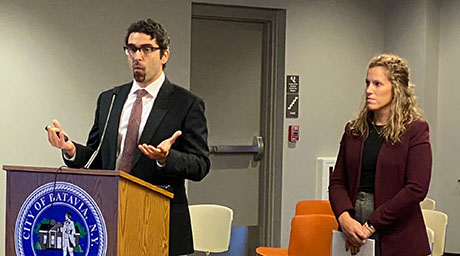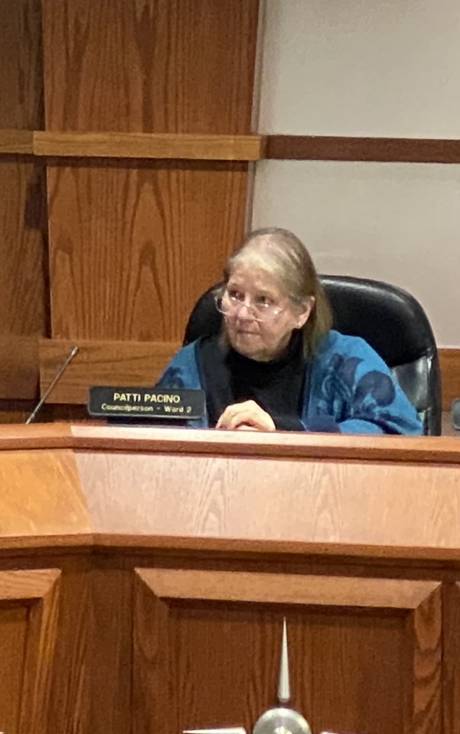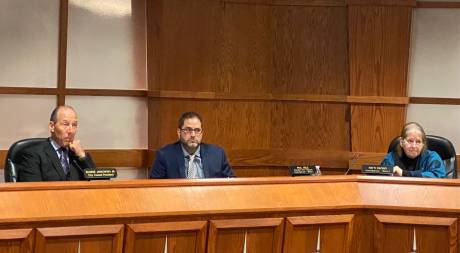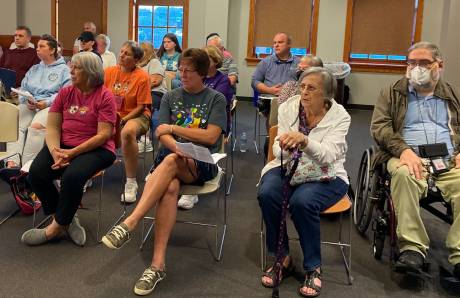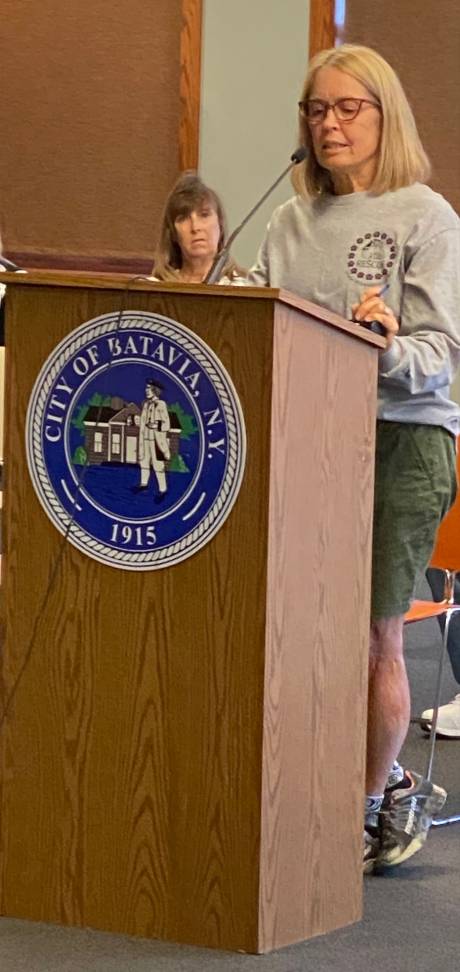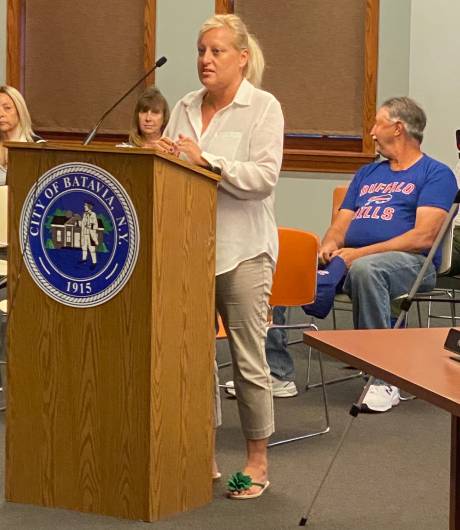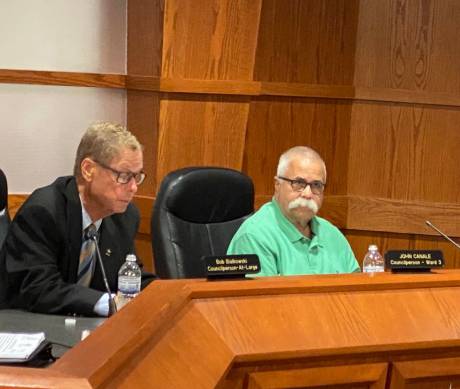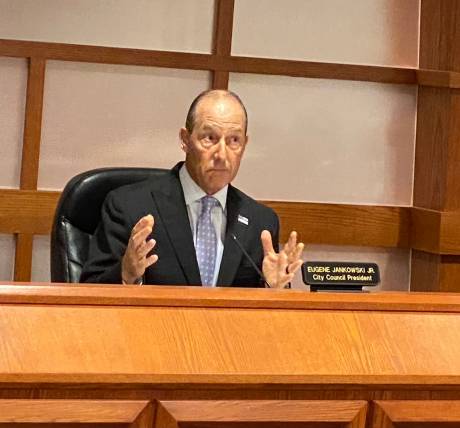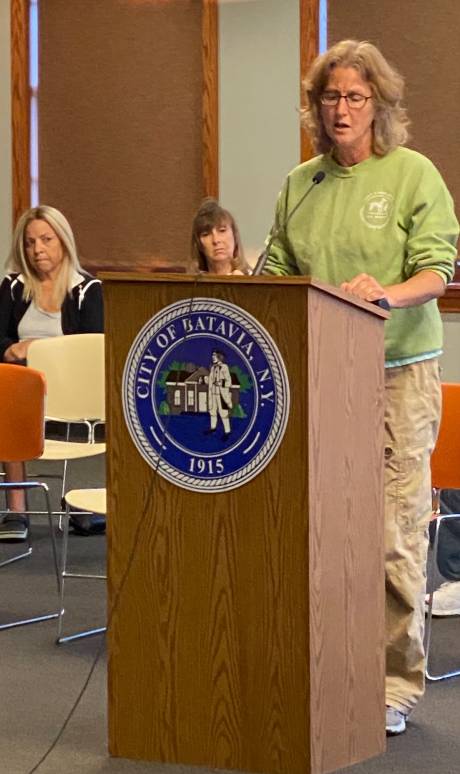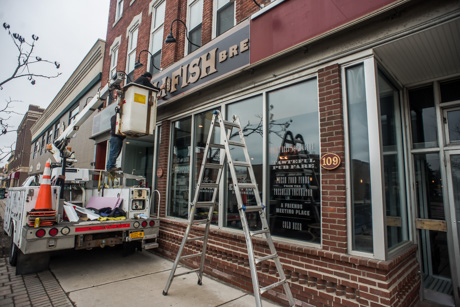A group of about 30 people attended Monday's City Council meeting, and half of them spoke about the proposed farm animals law to ban most farm animals from city limits and the feeding and care of feral cats. Volunteers For Animals member Robin Lewis, second row, in blue, waits to take her turn at the podium and dispute that a feeding ban does any good for feral cats
Forbidding people to care for homeless cats will not take care of the feral cat problem, Robin Lewis says.
She was one of about 15 people to share their thoughts during a public hearing Monday at City Hall.
“It is a cruel, inhumane, and ineffective way to solve a complex problem,” Lewis said to City Council.
In an audience of 30 or so spectators, half of them were there to voice support or opposition for a proposed farm animal law expected to go up for a vote later in the evening. The law would ban “owning, bringing into, possessing, keeping, harboring, or feeding” most farm animals and feral cats in the city, and limit chickens to six as long as they’re penned properly and don’t create an accumulated mess and odor.
Lewis and other speakers nailed one issue right on its head: it’s a complex issue when dealing with cats. She was with a group of fellow Volunteers For Animals members who stressed that the ban was not only unfair to homeless cats but that it doesn’t work for eliminating them. Spoiler alert: volunteers were happy in the end.
One point of contention was that feral cats and “community cats” are hard to tell apart; one group is often being well cared for by good samaritans while the ferals are cats born outside that are often unsocialized and therefore less friendly and seemingly wild.
Judy Sikora, who has lived in the city for 40 years, is one of those good samaritans who has been caring for stray cats. She has worked with Kathy Schwenk of Spay Our Strays to ensure the cats are spayed or neutered so as not to reproduce, and that they are healthy. There are some ferals that “occasionally do remain very wild,” she said, however, many others are redeemable to go up for adoption.
She has appreciated the work of Spay Our Strays and asked that council remove the cat ban from the proposed resolution.
“The work they do is incredible,” she said.
Kathy Schwenk, coordinator of Spay Our Strays, appeals to council that "these community cats should not be punished for one person."
Schwenk has been with Volunteers For Animals for the last 18 years and is coordinator for Spay Our Strays, which is a low-cost spay and neuter program for feral and outdoor cats. The group humanely sterilizes and vaccinates cats throughout Genesee County, including in the city of Batavia, she said.
“The caregivers did not ask for these cats. They're compassionate, caring, humans who cannot bear to see animals suffering. Some of them are in the audience right now,” Schwenk said. “These community cats should not be punished for the deeds of one citizen who irresponsibly harbors farm animals on their city property and infringes on their neighbor's rights.
“By including feral cats in the same category as farm animals, this is going to ensure undue suffering and spread of disease among our own community cats. So because of this proposed amendment, I've had several people, several upstanding city residents, contact me fearing that they will not be able to legally care for their outdoor cats anymore,” she said. “Some of these cats are strays, some are semi-socialized. Others have just been thoughtlessly left behind with a piece of trash and these compassionate people are caring for them.”
Her group worked with City Council seven years ago, after a presentation from SUNY Buffalo Law School recommended the trap/spay/neuter/vaccinate and release method for best controlling the stray cat population. Working with former Assistant City Manager Gretchen Difante and a task force, Spay Our Strays experienced “big success” by trapping 42 cats in one neighborhood, treating them per the program and releasing them. That was in 2016.
While the issue of feral cats has come up since then, it isn’t what triggered the farm animal ordinance. Complaints from neighbors about one resident, in particular, got the ball rolling. The resident owns four goats, plus chickens, a dog and a cat. Her Burke Drive neighbors have come to council previously and complained to their ward councilman John Canale. They were fed up with loose goats charging them, eating their foliage, and the animals creating a mess and foul odor.
Who'd want farm animals in the city? resident John Ladd asks during his time at the podium Monday evening.
City resident John Ladd wanted to clarify for council what his stance was. That was after he rattled off several dates of when he’d documented seeing loose goats or chickens “roaming freely out of their enclosures.” One day he found a goat standing on his front porch eating bushes. It might seem humorous, he said, but it makes him angry.
“We don’t want a limit on farm animals, we want no such animals allowed in the city limits,” he said.
Another speaker against the ban asked council to consider the aspect of people with disabilities having a right to a support animal. What if someone wants to have an emotional support cow or giraffe, Ladd said.
“Is that possible? Is it legal?” he said.
Some folks cited state and federal laws and statements from the American Society for the Prevention of Cruelty to Animals to support their positions on the proposed law. The resident at issue, who has said that her animals were therapeutic service animals for her daughter, was not present. Her father, Randy Turner, was present and vocal.
He estimated that although 75 percent of the city residents owned a dog or cat, “that has nothing to do with this,” he said.
“There’s no reason to have farm animals in the city,” he said.
I'm not against any animals, resident Shannon Maute says to council. These goats, these chickens, these ducks are not service animals.
Fellow residents John Roach and Shannon Maute also supported the ban on farm animals. Roach didn’t move to the city to be near them, he said. Maute, who lives on Burke Drive, isn’t against animals, and in fact, “I love animals,” she said. But the goats, the chickens, the ducks are not service animals, and one’s pets should be properly contained, she said.
“So far I’ve had to chase one goat, three chickens and a dog out of my yard,” she said.
After everyone had a chance to speak, Council President Eugene Jankowski asked for comments before a vote. Councilman John Canale first responded to the cat comments.
“I certainly did not expect to see this turnout,” he said. “I certainly recognize that we gave our blessing to that organization (SOS). I don’t know if it’s working or not, we haven’t heard from them in years.”
Councilman Bob Bialkowski removes his support for the proposed farm animals law, and Councilman John Canale shares that when he was a kid, a neighbor tried to raise a pig next door on Bank Street.
Canale would like to continue the trap-release program, he said, but to also have more communication between SOS and the city. He suggested that people who wish to be caregivers for homeless cats should contact the nonprofit and make sure those cats are properly spayed or neutered and vaccinated.
Councilman Bob Bialkowski questioned the legitimacy of the ordinance: “All of this because of one home,” he said.
He also wondered how, if farm animals are banned, it will go if a child wants a rabbit but can’t, while her neighbor has six chickens. He suggested that when people have issues on their streets, to “talk to your neighbor … it’s called addressing the problem.”
“I’m not supporting any of this,” he said.
Jankowski explained that the city police and code enforcement departments are aware of the one issue, but with no law, not much could be done to solve it. He also pointed to the fact that Turner owns the house where his daughter Judy lives with all of those animals, and he’s against farm animals in the city. That should tell you something, Jankowski said.
“There are other issues going on that we can’t talk about,” he said.
He then proposed removing the feral cats from the entire law or stipulating that the spay/neutering program must be part of it.
“It will delay us, but I’d rather get it right,” he said. “I think we lumped it in, it was an afterthought. We made a mistake.”
Council needs more time to thoroughly review the issue of feral cats, Councilwoman Patti Pacino said.
“I definitely think we need more time to think about it,” she said.
Fellow council members Al McGinnis, Kathy Briggs, Paul Viele and Tammy Schmidt agreed.
Council unanimously voted to move forward with the farm animals ban and remove cats from the entire equation. The pared-down law will move to the Sept. 26 business meeting for a vote.
Lewis paused for a second before reacting to that news.
"I'm ecstatic," she said. "We work to educate people and to educate them about feral and community cats. Feeding bans do not work."
Wendy Castleman of Volunteers For Animals cites that state law acknowledges the effectiveness of trap/spay/neuter/vaccinate/release programs as a way to stop cats from reproducing and the spread of disease. A feeding ban would be inhumane management of cats, she says, and it's a complex issue.
"We are very pleased that feral cats have been removed from the proposal," she said after the meeting. "The area volunteers will continue in their efforts to spay and neuter community cats in the city of Batavia as well as the surrounding area."
Photos by Joanne Beck.
